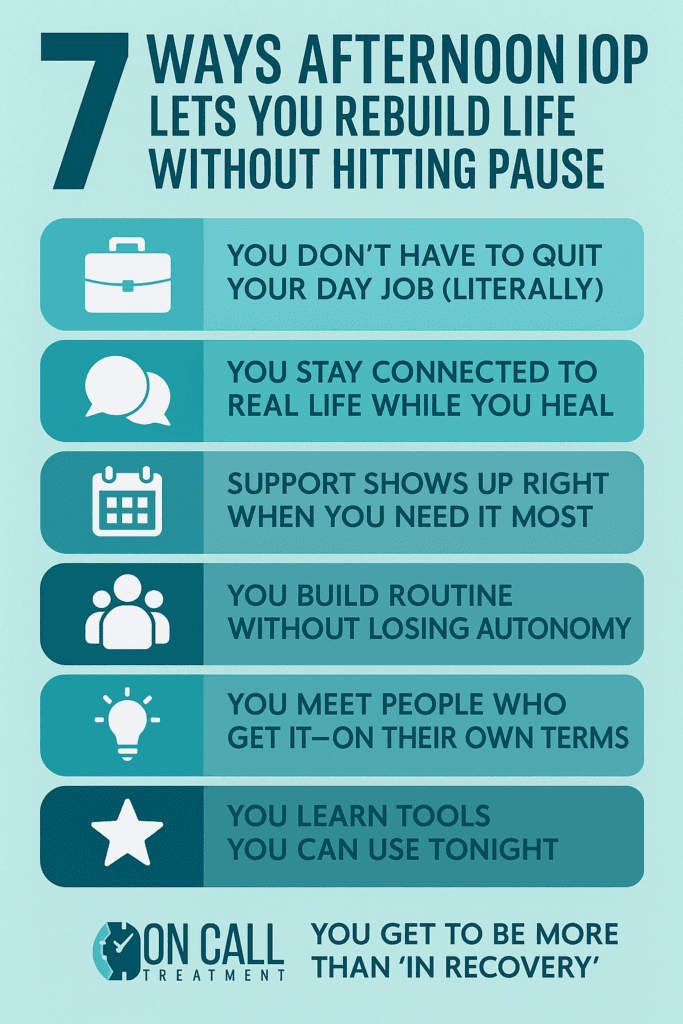Sometimes it feels like you only have two choices: dive into treatment full-time or keep pushing through like nothing’s wrong. But what if recovery could flex around your actual life—work, classes, kids, all of it? That’s exactly what afternoon intensive outpatient programs (IOPs) are designed to do.
If you’re sober curious, newly in recovery, or just tired of wondering what “better” could look like, here are 7 real ways afternoon IOP can help you grow—without making you hit pause on everything else.
1. You Don’t Have to Quit Your Day Job (Literally)
Afternoon IOP sessions typically run from around 1 to 4 p.m., making it possible to maintain your job, attend school, or handle personal obligations in the morning. Many people hesitate to seek help because they worry it means pressing pause on their life. But afternoon IOP is about fitting healing into your day without tearing everything else down.
The stability of work or school can actually support your recovery. Being productive and showing up for responsibilities gives your day structure—and afternoon IOP works with that, not against it.
2. You Stay Connected to Real Life While You Heal
One of the biggest challenges in recovery is learning how to live sober. Being in an environment where you’re isolated from the world can be helpful in the short term, but long-term healing means facing daily stressors and emotions with new tools.
Afternoon IOP lets you keep your connection to the real world. You’re not stepping away from life—you’re stepping into it with more support. That means less transition shock when treatment ends and more confidence that you can handle things as they come.
3. Support Shows Up Right When You Need It Most
For many of us, the afternoon used to be the danger zone. It’s when energy dips, cravings spike, and the emotional weight of the day can hit hard. Having a structured, supportive group to go to right when those feelings peak can make all the difference.
Instead of trying to white-knuckle your way through until bedtime, afternoon IOP becomes the anchor in your day. You get coping tools before you fall into old patterns. That kind of timing isn’t accidental—it’s powerful.
4. You Build Routine Without Losing Autonomy
Some treatment programs can feel rigid. Wake up, line up, eat, repeat. And while structure is important in early recovery, so is having space to feel like your own person. Afternoon IOP gives you that balance.
You build a rhythm—get up, handle your morning, then head to group. It becomes a consistent part of your day, not your whole identity. You still make choices, have responsibilities, and experience autonomy. But you’re not doing it alone.

5. You Meet People Who Get It—On Their Own Terms
Recovery doesn’t look one way. In afternoon IOP, you’ll meet others juggling jobs, caregiving, studies, and more. They’re not there because they dropped everything—they’re there because they chose to prioritize their mental health within the life they already have.
The connection you build in these groups is real. There’s power in seeing other people make this work. It reminds you that you’re not behind. You’re building your version of recovery—and that’s valid.
6. You Learn Tools You Can Use Tonight
Because you’re still in your routine, everything you learn in group is something you can apply almost immediately. Boundaries with coworkers? Emotional regulation when your kid melts down? Grounding techniques for stressful commutes? You get real-time practice.
That kind of immediacy makes the learning stick. It also means that progress feels tangible. You’re not just hearing theory—you’re living the change.
7. You Get to Be More Than “In Recovery”
It’s easy to feel like once you’re in recovery, that becomes your whole story. But you’re still a parent, an artist, a partner, a student, a person. Afternoon IOP honors that. It’s not about turning you into someone new—it’s about helping you show up more fully as you.
You’re building emotional tools, setting boundaries, reconnecting to what matters. And you’re doing it while still living your life.
FAQ: Afternoon Intensive Outpatient Programs in Waltham, MA
What is an intensive outpatient program (IOP)?
An IOP is a structured treatment option that allows individuals to attend therapy and support sessions several times per week while continuing to live at home and maintain responsibilities like work or school.
Why choose an afternoon IOP instead of a morning or evening one?
Afternoon programs are ideal for people who work early shifts, attend school in the morning, or have family obligations in the evenings. It offers a middle-ground that supports healing without overwhelming your schedule.
How long does IOP usually last?
Most IOPs last 6 to 8 weeks, though the exact duration can vary based on individual needs. Some people transition to a less intensive level of care afterward.
Can I still work while attending IOP?
Yes. Afternoon IOP is specifically designed to fit around common work schedules. Many participants attend before or after their shifts.
Is afternoon IOP effective for early recovery?
Absolutely. For many people, early recovery is about learning how to manage real-life situations sober. Afternoon IOP gives you that practice, with built-in support.
Do I need a diagnosis to attend IOP?
Not always. If you’re struggling with substance use or mental health and want support, you can usually begin with an assessment to see if IOP is a good fit.
Want to See If Afternoon IOP Fits Your Life?
On Call Treatment in Waltham, MA offers flexible afternoon sessions that meet you where you are. Explore what our intensive outpatient program in Massachusetts can offer—or just talk it through with someone who gets it.
📞 Call us at 833-287-7223. You don’t have to know exactly what you need. You just have to reach out.
